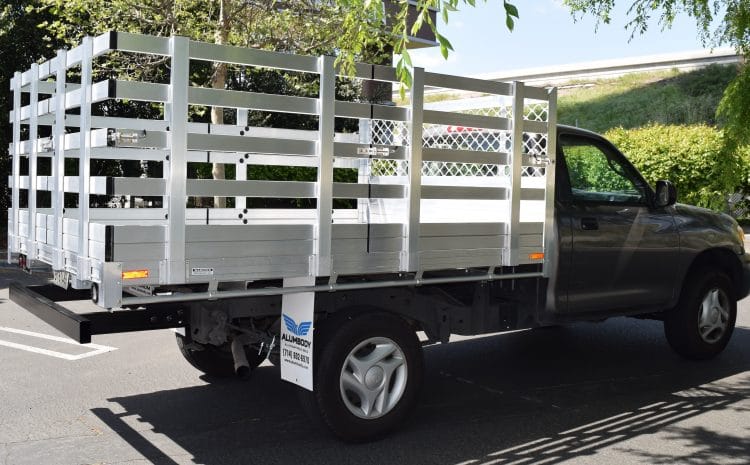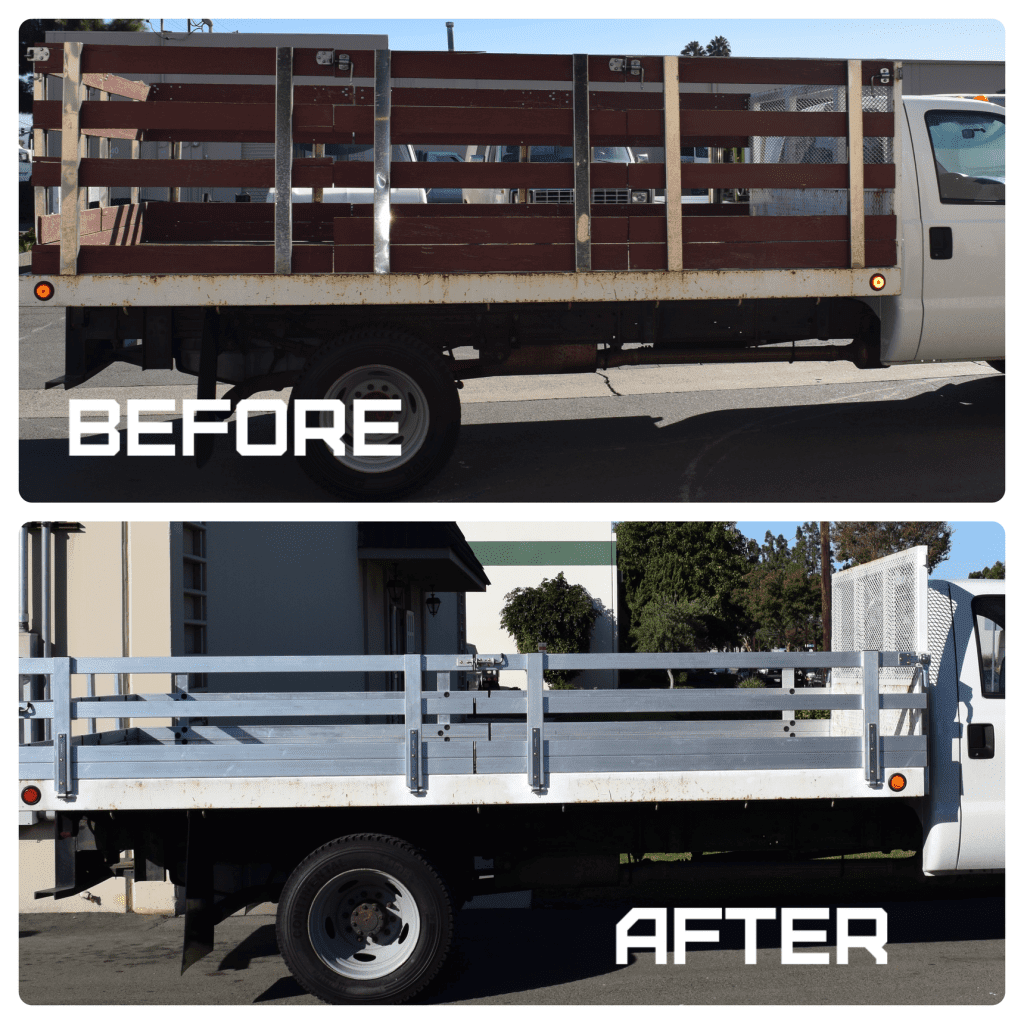
Aluminum Truck Beds vs. Steel Truck Beds
In the beginning, buyers didn’t worry about the metal used in building a truck bed because the only metal available was steel.
Steel had some problems though. The biggest problem was that it rusted. Even today, most steel starts to rust after only a year of use. Over time, a steel truck bed can slowly disintegrate.
When the all-aluminum truck bed came on the market in early 2000 it had a huge advantage over steel as a manufacturing material. Not only did aluminum resist rust and corrosion, it was also lighter. Aluminum Bed owners reported better gas mileage which added to its popularity.
All-aluminum beds tend to be more expensive than steel beds, however. And steel bed manufacturers claim aluminum beds just can’t withstand a heavy payload as well as a steel bed. This leaves buyers with a hard choice-do they pay more for an all-aluminum bed with its supposed superiority, or buy a more familiar steel bed and save money? Opinions vary wildly.
What are the facts, though? Is an all-aluminum bed really a better choice? Have steel bed manufacturers managed to overcome the material’s flaws? This article aims to answer that question.
Wood Gate Bed After 5 years vs Aluminum Bed after 5 years



Metallurgy for the masses
The big question to be answered is which metal is stronger. Steel bed supporters like to point out that steel has a reputation of being one of the toughest common alloys, while aluminum is more commonly known for its use as foil or pop can material.
However, the aluminum used in all-aluminum beds is an alloy, the same way that steel is an alloy of iron. This alloy has about the same yield strength as steel! It contains at least 95 percent aluminum, and the other five percent is composed of copper, titanium, chromium and zinc. Other metals are also added in trace amounts to further refine the alloy’s properties.
Steel companies, though, still can’t come up with a process that makes steel as rust-resistant as aluminum. The best they have is the galvanizing and galvannealing process, which coats steel with a protective layer of zinc in order to retard corrosion. Unfortunately, it only lasts until the layer is breached. Galvannealed steel can receive added protection with a coat of paint, but since truck beds are constantly exposed to harsh weather as well as high-velocity gravel the question is when, not if, the protective layers will be penetrated. Galvanizing and galvannealing is also expensive, so most steel truck beds only galvanize the skin to keep the price low. The trailer’s frame is left to the tender mercies of the environment.
High maintenance
Both kinds of truck beds require upkeep, but the biggest issue with aluminum truck beds is simply lubricating the hinges and latches..
Steel truck beds, on the other hand, must be examined constantly in order to prevent rust. Any scratches in the paint need to be touched up or the steel will start to oxidize. If the steel has been galvanized or galvannealed though, you won’t have to inspect the truck bed as frequently, but you’ll want to make sure that welded and riveted areas have been properly finished after every repair. The galvanic layer must be removed to weld, and rivets and screws compromise the galvanic coat.
This constant need to maintain the paint coat and the galvanic coat make steel truck beds repairs more expensive, too. Steel truck bed repairs are usually more expensive than similar repairs to an aluminum truck bed because Steel truck bed dealers have to repaint it to prevent rust, while galvanized and galvannealed steel has to be stripped of their zinc layer before they can be welded. Then the zinc layer must be reapplied after repairs, and finally the repaired area gets a new coat of paint.
On the road again
So aluminum truck beds require less maintenance, resists rust and corrosion and it has better overall durability. It sounds impressive, but how do steel and aluminum truck beds compare on the road? Truck owners who have owned both steel and aluminum truck beds consistently say that they get a smoother ride with an aluminum truck bed. They also say they can get a smoother ride with a loaded aluminum truck bed than they get hauling an empty steel truck bed!
The lower weight of an aluminum truck bed also translates into a higher payload capacity, meaning you can load more items into an aluminum bed before reaching the maximum amount of weight your vehicle can haul. Finally, as previously mentioned, several aluminum truck bed owners reported better gas mileage than they did with a steel one.
Warranties and resale
The fact that steel rusts presents a problem when reselling it. Steel truck bed only a couple years old often have patches of rust, which is difficult to cover or clean. Older steel truck bed can be badly rusted, unsightly and even a safety hazard, with rust compromising load-bearing components.
On the other hand, aluminum truck bed owners can keep their truck bed looking like new for decades with just routine maintenance. In terms of visual appearance, owners can clean the exterior with an oil eater cleaner which makes it look lustrous and pristine in minutes. These are just two reasons aluminum truck bed command a higher resale price than steel truck beds do.
As many aluminum truck bed buyers have discovered, all-aluminum truck bed have better warranties. All-aluminum truck bed companies almost always offer longer warranties than steel truck bed companies, which makes buying an all-aluminum truck bed a lower risk investment than buying steel.
Anti-aluminum myths
As you may have noticed, all-aluminum truck bed have several advantages over a steel truck bed. However, some articles on the Internet have talked about the problems with owning an aluminum truck bed. These articles have only one flaw-their facts are often manipulated. Below are some of the popular myths about all-aluminum truck bed, along with the real facts.
An all-Aluminumtruck bedis as heavy as steeltruck bed. Aluminum is only 1/3 as strong as steel, so three times more aluminum must be used to get the equal strength of a steel frame
This would be a better argument if aluminum truck bed were built from pure aluminum. However, the aluminum alloys used to construct these truck beds are substantially stronger than pure aluminum. More aluminum is used, but the end result is still a truck bed that weighs on average 10-15 percent less than a truck bed made of steel. That translates to hundreds of pounds that can be added to cargo weight-or not pulled at all.
Truck bed manufacturers aren’t the only ones who have figured this out. Automobile and airplane manufacturers have been replacing steel with aluminum, and the majority of the NASA Space Shuttles’ structures are constructed from aluminum alloys.
Steel is easier to repair than aluminum
Not anymore. Before aluminum became popular, more welders were familiar with welding steel and welding aluminum was another trick to learn. However, aluminum welding techniques are commonly known, and just about every welder knows how to work with aluminum. Consequently, the price has gone down as well, so the cost of getting an aluminum truck bed welded is comparable to the cost of welding a steel truck bed.
Aluminum stresses and tears more easily than a steeltruck bed
Okay, seriously-if aluminum is such an inferior building material, why is their resale value consistently higher than steel? Why do you rarely find a steel truck bed warranty that’s longer than the warranty on an aluminum truck bed? For that matter, why do people who own aluminum truck beds keep them longer on average than people who own a steel truck bed?
Now, if you want to be technical, steel is stronger than aluminum in some respects. It has a higher modulus of elasticity, for instance, which means more force must be applied to steel before it starts to bend. However, aluminum flexes three times as much as steel, which means that aluminum is more likely to spring back to its original shape after being stressed. Steel though, will probably stay bent. Steel also fatigues at lower levels of stress than aluminum, and steel’s rigidity makes it more vulnerable to cracking because of its brittleness.
You might also be interested to know that aluminum’s lower modulus of elasticity works in its favor as a construction material for truck beds. A lower elastic modulus means that an all-aluminum truck bed lessens impact shock loads while on the road, giving you a smoother ride.
The right metal for the job
The bottom line is that aluminum is a superior manufacturing material for truck beds. While a steel truck bed can do the job, an aluminum truck bed almost always does a better job. It can last longer, too. You may save money initially, but after watching your truck bed eventually wear down to rust and getting a replacement while your friends are still using an all-aluminum truck bed, you’ll know why so many people consider an all-aluminum truck bed a superior value.
